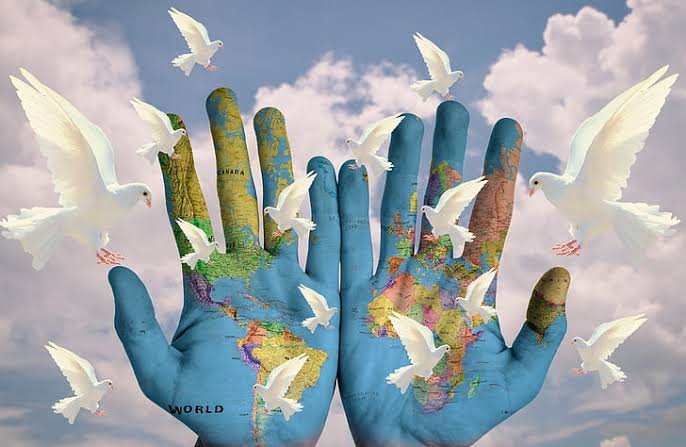As we stand on the precipice of 2025, the world finds itself grappling with the devastating consequences of conflict and violence that have marred the landscape of international relations. The year 2024 has been particularly tumultuous, with the ongoing Israel-Gaza conflict and the Russia-Ukraine war casting long shadows over humanity. These conflicts have not only resulted in staggering loss of life and displacement but have also eroded the very fabric of societies, leaving scars that will take generations to heal.
The violence in the Middle East and Eurasia is not merely a regional issue; it is a global crisis that demands urgent attention and action. The ramifications of these conflicts extend far beyond their borders, affecting global stability, economic security, and humanitarian efforts. As powerful nations like the United States, France, and members of the European Union continue to support various factions in these wars, it is imperative that we reflect on the broader implications of such involvement. The time has come for a collective reassessment of our priorities, with a focus on fostering peace rather than perpetuating cycles of violence.
The humanitarian toll of these conflicts is staggering. In Gaza, families are torn apart, children are left traumatized, and basic necessities such as food, water, and medical care are in short supply. Similarly, in Ukraine, the ongoing war has led to widespread destruction, displacing millions and creating a humanitarian crisis that the world cannot afford to ignore. The suffering of innocent civilians should serve as a clarion call for all nations to prioritize diplomacy and dialogue over military intervention.
In the face of such adversity, it is crucial for the international community to come together and advocate for peace. The United Nations, as the primary global body for conflict resolution, must take a more proactive role in mediating these disputes. It is essential that member states rally behind a unified approach that emphasizes negotiation, compromise, and reconciliation. The voices of those affected by these conflicts must be amplified, ensuring that their stories and needs are at the forefront of any peace initiatives.
Moreover, powerful nations must recognize their responsibility in shaping the course of global events. The support provided to warring factions often exacerbates tensions and prolongs suffering. Instead of fueling conflict, these nations should leverage their influence to promote dialogue and understanding. This requires a shift in mindset—from one of dominance and control to one of collaboration and empathy. The world is interconnected, and the consequences of our actions reverberate far beyond our borders.
Education and awareness are also vital components in the pursuit of peace. By fostering a culture of understanding and respect for diverse perspectives, we can begin to dismantle the prejudices and misconceptions that often fuel conflict. Initiatives that promote intercultural dialogue, peace education, and conflict resolution skills should be prioritized at all levels of society. Empowering individuals with the tools to engage in constructive conversations can pave the way for a more peaceful future.
As we look ahead to 2025, let us envision a world where peace is not just an ideal but a reality. This vision requires commitment from all sectors of society—governments, civil society, and individuals alike. Grassroots movements advocating for peace and justice must be supported and amplified. The power of collective action cannot be underestimated; history has shown us that when people unite for a common cause, change is possible.
In conclusion, the path to peace is fraught with challenges, but it is a journey worth undertaking. The conflicts in the Middle East and Eurasia are a stark reminder of the fragility of human existence and the urgent need for compassion and understanding. As we move into 2025, let us commit to fostering a culture of peace, where dialogue triumphs over discord, and love prevails over hatred. The time for action is now; let us work together to create a world where future generations can thrive in harmony, free from the shackles of violence and fear. The call for peace is not just a plea; it is a responsibility we all share. Together, we can make 2025 a year of hope, healing, and reconciliation.
Embracing the Philosophy of “One Earth, One Family, One Future”
As we step into a new year, it’s essential to reflect on the importance of global peace in securing a brighter future for humanity. Prime Minister Narendra Modi has been a vocal advocate for this cause, emphasizing the need for unity and collaboration among nations and communities. By drawing inspiration from India’s rich history and figures like Bhagwan Buddha and Mahatma Gandhi, Modi has reaffirmed India’s commitment to advancing global peace, unity, and brotherhood.
The philosophy of “One Earth, One Family, One Future” is a human-centric approach that aims to cultivate a peaceful world for future generations. This vision is particularly relevant in today’s world, where new conflicts are threatening the socio-economic stability of nations. Modi has argued that these challenges can only be effectively met through concerted global action and people-to-people engagement.
India’s dedication to promoting global peace is rooted in its historical commitment to non-violence and pluralism. As a champion of unity in diversity, India is uniquely positioned to take center stage in promoting global harmony. By embracing the philosophy of “One Earth, One Family, One Future,” India can play a pivotal role in shaping a more peaceful and prosperous world.
As we move forward, it’s crucial to recognize the importance of collective efforts in promoting global peace. Modi’s emphasis on people-to-people engagement and concerted global action serves as a reminder that peace is a shared responsibility. By working together, we can create a brighter future for all, inspired by the vision of “One Earth, One Family, One Future.”






